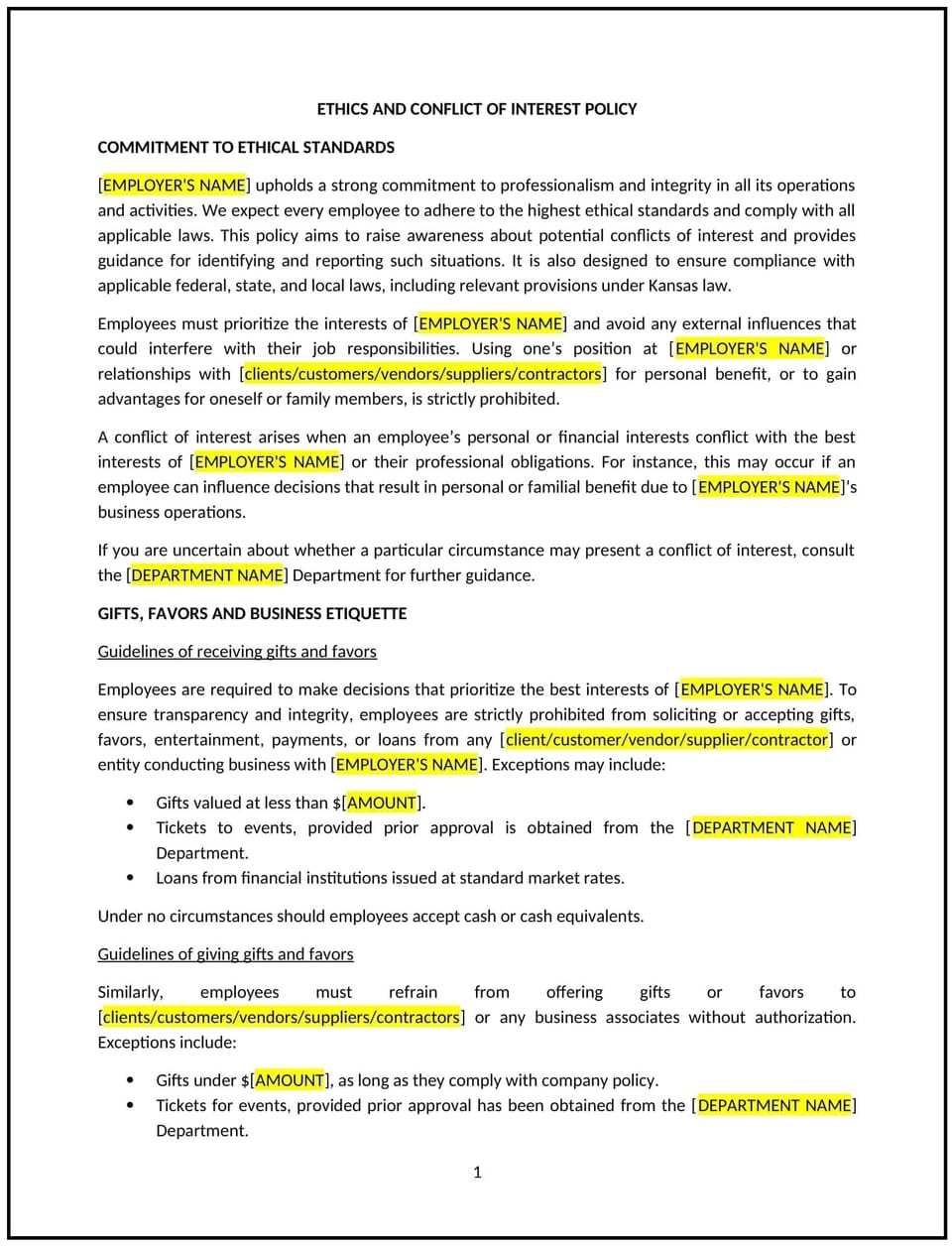Ethics and conflict of interest policy (Kansas): Free template

Ethics and conflict of interest policy (Kansas)
An ethics and conflict of interest policy helps Kansas businesses set clear expectations regarding ethical behavior and address potential conflicts of interest that may arise in the workplace. This policy outlines guidelines for employees to disclose conflicts, avoid unethical actions, and maintain integrity in their professional roles.
By implementing this policy, businesses can uphold high ethical standards, protect their reputation, and ensure that employees act in the best interests of the company.
How to use this ethics and conflict of interest policy (Kansas)
- Define conflicts of interest: Businesses should clearly outline what constitutes a conflict of interest, such as personal, financial, or familial relationships that could influence business decisions.
- Set disclosure requirements: Businesses should require employees to disclose any potential or actual conflicts of interest as soon as they arise.
- Establish approval processes: Businesses should define how employees should submit conflict of interest disclosures, including who will review and approve or address the situation.
- Address gifts and entertainment: Businesses should specify whether employees can accept gifts, entertainment, or other perks from clients, vendors, or business partners, and outline acceptable limits.
- Promote transparency and accountability: Businesses should encourage open discussions regarding conflicts of interest and foster a culture of honesty and responsibility.
- Outline consequences for policy violations: Businesses should detail the consequences for failing to disclose conflicts of interest or engaging in unethical behavior, including disciplinary action or termination if necessary.
- Review and update regularly: Businesses should periodically assess the policy to reflect changes in the business environment, legal requirements, or industry best practices.
Benefits of using an ethics and conflict of interest policy (Kansas)
- Promotes transparency and trust: Establishes clear ethical guidelines, fostering trust between employees, management, and external stakeholders.
- Protects the company’s reputation: Prevents situations that could lead to ethical lapses, conflicts, or legal issues that damage the business’s public image.
- Reduces legal and financial risks: Helps minimize the potential for legal consequences or financial loss caused by unethical behavior or undisclosed conflicts.
- Encourages ethical behavior: Reinforces a culture where employees are expected to act with integrity and make decisions that align with the company’s values.
- Strengthens decision-making: By addressing conflicts upfront, businesses can ensure that decisions are made based on business needs rather than personal interests.
- Enhances employee confidence: Employees are more likely to feel valued and protected in a company with clear ethical guidelines and transparent conflict-of-interest management.
Tips for using this ethics and conflict of interest policy (Kansas)
- Communicate the policy clearly: Businesses should ensure all employees understand the ethics and conflict of interest policy and the importance of full disclosure.
- Provide regular training: Businesses should train employees on how to identify potential conflicts of interest and how to address them in accordance with the policy.
- Implement a confidential reporting process: Businesses should provide employees with a confidential method for disclosing potential conflicts of interest without fear of retaliation.
- Encourage proactive disclosure: Employees should be reminded that disclosing a conflict of interest early is better than failing to disclose and risking damage to the company or their career.
- Monitor and enforce the policy: Businesses should regularly review disclosures and address conflicts of interest in a timely and consistent manner to maintain trust and accountability.
- Review legal and industry standards: Businesses should stay informed about changes in laws and industry practices that may affect their conflict of interest policy.
Q: Why should Kansas businesses implement an ethics and conflict of interest policy?
A: Businesses should implement an ethics and conflict of interest policy to promote transparency, protect the company’s reputation, and ensure employees act with integrity in all business dealings.
Q: How should employees disclose conflicts of interest?
A: Employees should disclose any potential conflicts of interest to HR or their direct supervisor as soon as they arise, following the procedures outlined in the policy.
Q: What should businesses do if an employee refuses to disclose a conflict of interest?
A: Businesses should enforce disciplinary action as outlined in the policy, which may include warnings or termination, depending on the severity of the situation and company guidelines.
Q: Can employees accept gifts or entertainment from clients or vendors?
A: Businesses should clearly define acceptable limits for receiving gifts or entertainment and set boundaries to prevent conflicts of interest from arising.
Q: How often should businesses review and update their ethics and conflict of interest policy?
A: Businesses should review their policy at least annually or whenever there are changes in the legal environment, industry practices, or company operations to ensure it remains effective and relevant.
This article contains general legal information and does not contain legal advice. Cobrief is not a law firm or a substitute for an attorney or law firm. The law is complex and changes often. For legal advice, please ask a lawyer.


